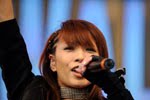Bombs strike Baghdad apartment buildings, 39 dead.
 At least five massive bombs hit apartment buildings across Baghdad on Tuesday, killing at least 39 people and wounding more than 130 in the latest sign Iraq's fragile security could dissolve in the chaos of the unresolved election.
At least five massive bombs hit apartment buildings across Baghdad on Tuesday, killing at least 39 people and wounding more than 130 in the latest sign Iraq's fragile security could dissolve in the chaos of the unresolved election.It was the fourth attack with multiple casualties across Iraq in five days, a spate of violence that has claimed more than 100 lives since Friday. The attacks have spiked as political leaders scramble to secure enough support to form a government after the March 7 parliamentary elections failed to produce a clear winner.
Ayad Allawi, whose bloc came out ahead in the vote by two seats over Prime Minister Nouri al-Maliki's, said the political deadlock caused the recent wave of violence.
"This is blamed on the power vacuum, of course," Allawi told The Associated Press in an interview Tuesday, saying "extreme forces" are trying to exploit the political uncertainty.
Maj. Gen. Qassim al-Moussawi, an Iraqi military spokesman for Baghdad's operations command center, said the attackers detonated blasts using homemade bombs and, in one case, a car packed with explosives. He said there were at least seven blasts; the U.S. Embassy in Baghdad said there were five.
"There are casualties, and we are counting them right now with the Health Ministry," said al-Moussawi, who blamed al-Qaida in Iraq insurgents for the explosions and said Iraq was in a "state of war" with terrorists.
He said most of the buildings are two stories, but one in the Allawi district downtown was five stories.
Police and medical officials said the death toll was at least 39, and that women and children were among the dead. They spoke on condition of anonymity because they were not allowed to release information publicly.
The explosions started at about 9:30 a.m. at a residential building in the Shula area of northwest Baghdad. Then a car bomb struck in an intersection about a mile away, damaging nearby buildings, police and hospital officials said.
They spoke on condition of anonymity because they were not authorized to speak with the press.
A few minutes later, at 9:45 a.m. a bomb left in a plastic bag exploded at a restaurant in the Allawi district downtown, near the government's Culture Ministry. Dozens of people gathered at the bomb site in the hours after the explosion, digging through bricks in the hopes of finding survivors.
College student Ali Hussein, 22, was riding the bus to school when one of the Shula bombs exploded. He described "people running in different directions with fear."
"Cars began to collide with one another in street because of fear," said Hussein, who fled for home after the blast. "We saw a cloud of fire and black smoke raising from a building at the explosion site, and while we were terrified by this explosion, another one took place."
On Monday, a Shiite couple and four of their children were gunned down in their home outside Baghdad, while more than 40 were killed Sunday after suicide attackers detonated three car bombs near embassies in Baghdad. On Friday, gunmen went house-to-house in a Sunni area south of Baghdad, killing 24 villagers execution-style.
Many fear such violence and a drawn-out political dispute could allow insurgents to regroup in the political vacuum left after the elections.
Nearly a month after the national vote, Iraq still finds itself in a political deadlock.
Allawi's secular Iraqiya bloc won 91 of the 325 parliament seats to 89 for the mainly Shiite list of Prime Minister al-Maliki. But both parties are far short of the necessary majority needed to govern alone, which has forced them into bargaining with other smaller blocs to muster the support needed to form a governing coalition.




























0 comments:
Post a Comment
We encourage people to contact us with any comments regarding news or any other queries about this site. We will respond you respectively and promptly.
We are going to moderate comments only to avoid unwanted and spam messages.
Thanks for your interest ! ! ! ! ! ! !